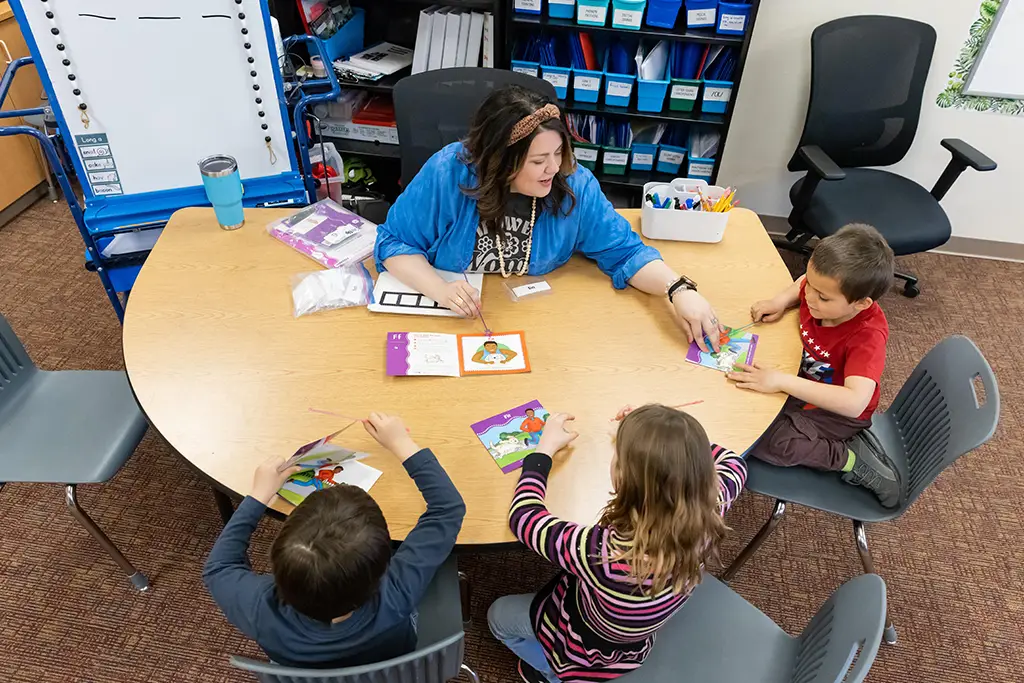
Early Childhood Education vs. Elementary Education
Early childhood education emphasizes developmental milestones and play-based learning, whereas elementary education builds on those foundations with a focus on academic subjects and structured learning.
Request Information
Young children are like seeds planted in a garden. Every bit of sunlight, water, and care they receive influences how they grow. Education during one's early years is much like tending to that garden, with early childhood education and elementary education serving as two of the earliest stages in one's academic journey and life overall.
These early phases carry tremendous influence. So, for those interested in education careers, exploring early childhood education vs. elementary education is a must. Though they both involve guiding and teaching young children, they differ significantly in terms of their approach and focus.
Defining Early Childhood Education and Elementary Education
Early childhood education (ECE) is often defined as a branch of education that focuses on the learning and development of children early on. According to the National Association for the Education of Young Children (NAEYC), ECE supports the growth of "the whole child," focusing on their physical, social, emotional, and cognitive needs.
Elementary education, on the other hand, focuses on the formalized instruction of children, typically from kindergarten through fifth grade. It helps children transition from exploratory learning to more formalized academics.
Differences in Teaching Methods
Early childhood and elementary education each reflect distinct philosophies that cater to different stages of child development. In ECE, teaching methods are often centered around play-based learning, sensory exploration, and social-emotional growth. They draw on foundational theories from pioneers like Friedrich Froebel, Maria Montessori, and Erik Erikson.
Play is the highest expression of human development in childhood, for it alone is the free expression of what is in a child's soul.Friedrich FroebelEstablished the kindergarten model
Complementing Froebel's philosophy, Montessori's approach highlights hands-on sensory experiences as fundamental to learning, following her belief that "education is a natural process carried out by the child and is not acquired by listening to words but by experiences in the environment." This model encourages young children to learn through tactile materials and self-directed activities that invite discovery, reflecting her view that sensory engagement is a precursor to intellectual development.
In addition to play and sensory experiences, Erik Erikson's psychosocial theory stresses the role of nurturing interactions to help with a child's emotional and social growth. ECE teachers facilitate this growth by creating an environment that allows children to explore their social world, gradually learning to navigate relationships and emotions in a safe space.
Early Childhood Education
- Play-based learning
- Sensory exploration
- Focus on social-emotional development
Elementary Education
- Stuctured
- Curriculum-driven lessons
- Focus on subject-specific outcomes
As children move into elementary education, the teaching focus shifts towards structured, curriculum-driven lessons designed to achieve specific academic outcomes. Jean Piaget's developmental theory offers insight into this transition, as he noted that by age seven, children typically enter the "Concrete Operational" stage, where they are more capable of logical thought and systematic problem-solving. Unlike ECE, elementary education emphasizes teacher-led instruction where foundational skills in literacy and numeracy are progressively built upon through organized activities.
Lev Vygotsky's Zone of Proximal Development (ZPD) further supports this approach, suggesting that learning is most effective when tasks are within a child's reach but require guidance from a more knowledgeable individual. This philosophy aligns well with elementary education's structured framework through which teachers in elementary classrooms introduce subjects incrementally, providing support that gradually leads students toward independent mastery of skills.
Another dimension of elementary education is its focus on subject-specific outcomes, guided by philosophies such as John Dewey's "learning by doing." In elementary classrooms, this philosophy translates to lessons in science, math, and social studies that encourage practical application, thereby giving students the tools to connect theoretical knowledge with hands-on learning.
Unlike ECE's broader developmental focus, elementary education narrows in on subject matter, steadily advancing students' knowledge and skills through carefully crafted lessons.
Differences in Curriculum
The curricula difference between early childhood education and elementary education is a direct reflection of their focus and teaching methods.
ECE curricula tend to prioritize flexible and child-centered approaches instead of rigid academic ones. Although they do often integrate foundational literacy and numeracy, it's in such a context that it still prioritizes the social, emotional, and cognitive growth of the children.
In contrast, the elementary education curriculum is structured around formal subjects, with set learning objectives and measurable outcomes. The curriculum aligns with standardized benchmarks, including milestones in literacy, numeracy, and critical thinking skills, providing a scaffolded approach to learning that gradually increases in complexity.
Age Groups and Developmental Focus
The specific age ranges for each type of education can vary depending on the source. For some, early childhood education begins with birth and ends around age 5, but according to UNESCO, it extends up to age 8. That's because this stage is critical for sensory exploration, language acquisition, and social-emotional development. During this period, children are highly receptive to their environment, learning best through play and interactive, hands-on experiences that foster intrinsic curiosity.
Elementary education generally serves children ages 5 to 7 and continues through ages 11 to 13, with developmental goals shifting toward structured, independent learning. At this stage, children develop cognitive skills like logical reasoning, problem-solving, and the ability to process more abstract concepts, making this period ideal for introducing academic structure, logic-based learning, and peer collaboration.
The age overlap between early childhood education and elementary education also encompasses the transition period when children move from play-based, sensory-rich environments to more formal education focused on cognitive and academic skills. Some educational systems address this by including early childhood programs within elementary schools, allowing young learners to progress more easily and steadily as they adapt to increased structure and independence in their learning.
Career Opportunities and Considerations
ECE and elementary education each offer various fulfilling career paths that are not limited to the role of educator or teacher.
Generally, careers in early childhood education are designed to support the foundational stages of development. Therefore, key roles include:
- Preschool teachers
- Daycare providers
- Early learning curriculum specialist
- Early childhood education program directors
- Early intervention specialists
The educational requirements for these careers can vary. Many professionals start with an Early Childhood Education degree, which, at UND, is also available as an accelerated option for faster completion. For even more flexibility, an online Early Childhood Education certificate is also an option, enabling individuals to qualify for certain roles without committing to a full degree program.

Professionals seeking to specialize in the field may pursue a Master's in Early Childhood Education, with specializations such as early intervention or curriculum design, or opt for a B.S. in Early Childhood Education combined with an M.Ed. in Special Education, a route that prepares them to work with young children requiring specialized support.
Some choose to add an Early Childhood Education minor, not necessarily to pursue a role in the field but to complement degrees in psychology or social work, deepening their understanding of child development to enhance their work.
Elementary education careers focus on foundational academic instruction and supporting children's transition to more structured learning environments. Key roles include:
- Elementary school teachers
- Curriculum coordinators
- School administrators
- Elementary education program director
Many elementary educators start with a bachelor's in Elementary Education, which offers training in classroom management and subject-specific instruction. The accelerated Elementary Education degree provides a quicker path to certification for those who want to enter the field promptly. For educators who want to advance, a master's in Elementary Education provides the flexibility to gain advanced qualifications while continuing to work. Those interested in literacy might pursue an accelerated Elementary Reading Education program, focusing on developing and implementing reading curricula.
Meanwhile, for individuals who wish to support children with additional needs, becoming a special education teacher offers a fulfilling path. Special education teachers benefit from skills in behavior management, individualized instruction planning, and understanding of learning disabilities.
Factors Influencing Career Choice
Career choice is a deeply personal decision that can be influenced by multiple factors, including individual interests, values, skills, and personal influences. People often find their choices influenced by role models, life experiences, or even cultural and societal expectations. For many, there's a guiding desire to contribute to the world in a meaningful way, often paired with a focus on work-life balance, job security, and career growth potential.
When deciding between ECE and elementary education, individuals may consider where they feel they can make the most impact and how their personality aligns with each age group. ECE tends to focus on the formative years, where educators shape the earliest social and cognitive foundations of children. Elementary education, however, involves a broader range of developmental milestones and provides opportunities for deeper academic instruction.
The story of Mary Martin, a UND alumnus who followed in her father's footsteps to become a principal, highlights how family influences and personal experiences shape one's career path. Mary, who initially saw herself purely as a teacher, eventually found that school administration allowed her to impact even more students, a realization that speaks to how a career path can evolve over time. Her father's approach to education—building relationships and making students feel valued—showed her the kind of environment she wanted to nurture, both as a teacher and eventually as a principal.
For individuals choosing between ECE and elementary education, reflecting on experiences and influences, much like Mary did, can provide clarity. If someone has a natural ability to connect with younger children and values the nurturing aspects of education, they may find ECE to be the right fit.
On the other hand, if they aspire to play a role in more structured academic development while still making personal connections, elementary education might be a better match. Mary's journey illustrates that career paths in education, whether teaching or administration, often intertwine with the values and passions learned from those who came before us, shaping careers that feel personally meaningful and impactful.
Conclusion
A career in education, whether it be in early childhood or elementary education, will be filled with opportunities to inspire and grow. Take a moment to reflect on both options and your teaching style to determine which suits your strengths and passion.
Once you have your answer and are ready to take the next step, join one of UND's education programs. They are all dedicated to preparing skilled educators and other education professionals. With us, you'll find the support and resources to guide and uplift the next generation.
FAQs
Certainly! Pursuing a career in early childhood education can be highly rewarding and emotionally fulfilling as it provides you with the opportunity to guide young children's growth and development.
Early childhood education encompasses the teaching of children from birth up to eight years old, which includes but is not limited to preschool. So, while preschool is a component of early childhood education, the two are not synonymous.
The difficulty between early childhood and elementary education depends on personal strengths. Early childhood focuses on foundational skills and patience with younger children, while elementary involves structured academics and larger classes. Each has unique challenges based on the age group you prefer.